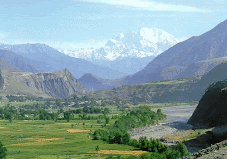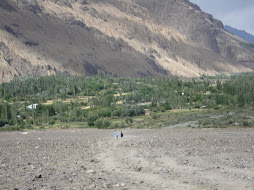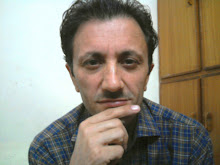This entry is a brief interlude in my Chitral story. Never fear, the next stage will be written very shortly, but in the meantime one of my colleagues (Tayib Jan) has written an article about traditions in the Wakhi culture. The Wakhi people come from the Wakhan corridor in Afghanistan, which is a narrow stretch of land between N Pakistan and Tajikistan. But Wakhi people now live in Afghanistan, Pakistan, China and Tajikistan, in the Pamir region. Nearly all Wakhi people are Ismaili, and their language is very similar to Persian. The following article is about their traditons and culture, particularly within the family. I really wish he had given it to me before I went to Chitral, as the culture there is quite similar, and according to this I made some fundamental errors. But never mind....
'Childhood, youth and old age are natural phenomenon, but they are also socially constructed and mean different things in different societies. Generally, for the purposes of gauging human development, stages are classified as beginning, early childhood, middle childhood, adolescence, young adulthood, middle adulthood and late adulthood. There are not age limits as such set internationally or nationally at what age we are young and at what age one gets old. It has more to do with the cognitive abilities and working capacity or physical activeness. Some people used to say that when the hair turns gray one becomes old, but today even very young children have grey hair. Socially it can be measured against more or less experience; a synonym for being knowledgeable against being naïve or novice. When youth assume that the old people are ignorant of the demands of time, or when old people think that the youth has a little know-how of the world and its complexities, cracks can develop in society.
Many societies and families have long traditions of authority in which most decisions are made by the elders. If the tradition of accepting the elders is deeply inculcated in the youth the system moves very smoothly. Otherwise, issues of disagreement escalate and on occasions turn into serious revolt. In some cases children have tried to get rid of their elders by sending them to old age facility centers or used some other innovative brutal ways. In other cases the youth have tried a simpler way of just ignoring them despite of the age related requirement that the need to be in some company at least for few hours a day to share the wealth the knowledge they have stored from childhood through youth and to the old age. Some old people are smart and lucky enough to find their grandchildren as their friends. They talk to them and love listening to their experiences and reflect on how much the world has changed.
The Wakhi older adults are good models of vigor and zest. Some people live to ripe old age, as my own grandfather grew as old as 120 years. There are some social factors attached to energy that boost their morale because they feel honoured in the society. In this paper I am going to talk about the titles used for them, decision making, and position at home, dinning, dancing and walking. This paper will not only help the honorable visitors of the Wakhi homes rather it will also allow our own youth to remind themselves of the traditional values of our society. I am aware of the fact that their will be commonalities in other traditions such as Brushaski, Shina, Khowar, and Dari but I will focus on Wakhi so that I do not confuse people.
The Wakhi elders can be called “Mapair”, “Akabeer”, Moye Safeed” or Akhasqool”. Mapair and Akhasqool have the same meaning as old man. Therefore people do not use both these words as they have negative connotations. Akabeer (wise man) and Moye Safeed (white haired man or women meaning experienced). But the most common word used is “Puop”, which means grandfather. The beauty of this title is that it is not necessary that a person needs to be a real grandfather to be called pup. All old males are called pup and while meeting them the first time after a long absence it is necessary to kiss the back of their hands. In return the pup will also kiss the back of your hand. Old ladies are called “Kumpir” meaning old woman and “moum” meaning grandmother. Old women are normally called mum whether they are really grandmother or not and it is an obligation to kiss the back of their hands while visiting them.
The elders of the family, whether male or female, make most of the decisions at home. The decision-making process is mostly participatory and based on common understanding. In the case of marriages, Wakhis are moderate as the boys and girls decide to whom they should marry. The process is carried out through informed consent of the family, especially with the elders.
The elders sit at the most honorable and reserved place in the traditionally built homes. The man sits on the right side and the woman on the left. Nobody else can take their position no matter whether they are head of state or the wealthiest person. The guests, however, can be offered to sit in their places but it is normally considered a good attitude to let the poup or moum sit in their position and the guest sits beside them. In the same fashion the rest of the house is divided into second, third and so on ages. If a person is really naïve it is said he/ she is so simple that “does not know how to sit or stand”. One needs to be really careful in visiting a Wakhi house to avoid taking somebody’s place. The youngest (no matter how educated or having good social status) gets a place in the “burj” means corner in a fully packed house. Relaxing your feet towards somebody or sitting in a way that somebody is at your back is the rudest act.
Food is normally served at a fixed time and at particular place, called the Neekard in the traditional houses. The sheet that is spread on the floor to put the food on is called “Destorkhon”, which is the same in Dari and Persian. It is generally a clean piece of cloth or plastic sheet and people sit around it. When the food is served every body waits the eldest of in the group to start first and other people follow. One of the people takes a full roti called “Shapeek” and offers it to others to take. In such situation one takes a small piece and thanks the person who offers it. Wakhi eating style is very formal, the host will keep on suggesting taking more. Sometimes when this is done by the host puop the situation gets serious! The puop suggests eating more food and can keep on loading your plate with meat or rice. In this case simply ignoring the offer or rejecting it is unacceptable behavior which is really rude. The young are supposed to keep a speed that they finish later than then elders. One can not stop eating until the elders are finished eating. When a person wants to take water he/ she offers others to take it first. In most of cases it is politely rejected by thanks “Schobosh” or “shukriya”. After the food everyone offers prayers for the host and the family who served them. The puop prayers in Wakhi are, for example “May God fill your house with riches”, May God bless all your family” and a lot or more which will be another topic of my writing.
Wakhi, especially men, like dancing but it is very well developed social activity. If somebody wants to see the hierarchy of age in a family or in a bigger clan one should see the dancing line. The line goes from the eldest to elders and to young children. Everybody in a dancing team should follow the team leader who is the most senior person in steps, body movement and speed. The whole dancing team will salute the eldest in the audience before, during and after the dance which lasts 5 to 10 minutes. To show respect the audience encourages the dancers by clapping. Crossing the elders to take the lead, taking a longer time, breaking the row, deferring the elders’ footsteps or standing at the wrong position is really impolite.
Wakhi people like walking, and the landscape where we come from means that we need to walk. Walking in the Wakhi tradition is really difficult - there are some complexities and formalities related to it. The Wakhi elders usually lead the walking and they keep the same hierarchy while walking in a line. This does not mean that whenever the Wakhi walk they walk in a line, but it has something to do with the landscape. There are a lot of narrow walking tracks spread all over the area so people are compelled to follow narrow windings.
Some people might think these are just symbolic but there are tokens of respect attached to all these rituals. There are no certain criteria by which respect can be measured rather it is day and night. The presence of light is called day while the absence of it is night. The same is the case with this semiotic representation of elders’ respect. --courtesy georgechetwynd.blogspots.com
Friday, November 7, 2008
Subscribe to:
Post Comments (Atom)
Awesome and rugged

Beauty of Chitral

Kishmanja, a beautiful village in Yarkhun valley
Lush green

DIZG: threatened by floods

The legendary village of Ayun in Chitral

On way to Bumburet
Dizg, Yarkhun

Blog Archive
-
▼
2008
(197)
-
▼
November
(35)
- PIA continues denying tickets to Chitral passengers
- Blocked traffic diverted to alternative route
- The New York Times > World > Image > A Controversi...
- Public up at arms against new bus fares
- Lowari tunnel digging to complete by Jan 15: minister
- How safe is the Lowari tunnel?
- Formation of forest committees discussed
- Paragliding club to be set up in Chitral
- NATCO service in Chitral
- Call to appoint civil judge at Drosh
- Writ of district govt in Chitral bazaar
- Lowari Pass re-opens
- Bul Subedar passes away
- Rs110 million released for power house expansion
- Chitral: Parkusap bridge inaugurated
- Fuel crisis: Federal govt comes to Chitral's rescue
- NHA rules out Lowari tunnel opening this year
- POL crisis may hit Chitral
- Khowar-Urdu dictionary launched
- Bodies of martyred Scouts still not dispatched to ...
- Kidnapped girl recovered, handed over to father
- A window into culture at the roof of the world
- Clue to kidnapped Afghan found: DPO
- Midwifery school opened in Chitral
- $30 million agreements on Golen Gol hydrpower proj...
- Advocacy workshop on mother, newborn health begins
- Chitral lawyers observe black day
- Kidnapped man was a former Afghan official, says D...
- Afghan official kidnapped from Chitral
- Islamabad-Chitral flights opposed
- Chitral police claim netting notorious drug peddlers
- Tehrik-i-Insaf students wing elects office-bearers
- Mosaic training programme concludes in Chitral
- Liquor seized
- Preparations for Lowari tunnel festival reviewed a...
-
▼
November
(35)
About Me

- Zar Alam Khan Razakhel
- Village Dizg, Yarkhun valley, Chitral, Pakistan
- I blog at http://chitraltoday.net (ChitralToday) about Chitral, its people, culture, traditions and issues. I have been writing about Chitral since 2000. Chitral is a scenic valley in the extreme north-west of Pakistan.
No comments:
Post a Comment